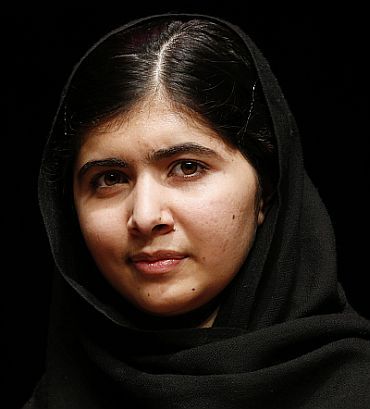 Sherna Gandhy hopes Malala Yousafzai can convince the Indian government it is their responsibility to ensure our children get a decent education.
Sherna Gandhy hopes Malala Yousafzai can convince the Indian government it is their responsibility to ensure our children get a decent education.
The poor kid gets a bullet in the face for standing up for girls' education and the next thing you know, she's up for a Nobel.
It helps that the men who shot her are at the very top of the Western world's most wanted and hated list, and that the 16-year-old has the poise of a seasoned celebrity.
Her cause too is largely uncontroversial. Except for the loonies who took pot-shots at her, no one with any credibility can argue against the education of girls.
You could hardly have missed Malala Yousafzai in the past few months -- and particularly in the last fortnight or so.
Correctly attired in colourful but unrevealing clothes, not a trace of make-up on her young face (a huge relief from the overpainted, underdressed teen idols we are used to seeing), she has graced the podium of the United Nations, reduced the sarcastic Jon Stewart to an abject admirer and chatted with television's power woman Christiane Amanpour (where she showed her naivete somewhat by saying she wanted to become the prime minister of Pakistan).
She has met presidents and prime ministers, reduced hard-boiled talk show hosts and journalists to putty, and has written a book about her young life.
That's pretty impressive for a young teen from an ordinary family in Pakistan's remote Swat Valley who, a year ago, was mostly concerned about topping her class in school.
That's what many of us think. But that's not the whole story.
The outside world may not have heard about her before the mad Talib shot her, but Malala is no stranger to public acclaim. She has appeared a few times on Pakistan television, espousing the cause for girls’ education.
Nor does she come from an ordinary family. Her father is an educationist. He has strongly encouraged girls' education and founded the school in which Malala studied, whose standard was well above the usual run of schools in the district.
One might say that it was being shot as dramatically as she was, in her school bus, that caught the world's attention.
The serendipitous presence of two English doctors at the Peshawar hospital where she was being treated ensured her entry into Britain, where her struggle for life was minutely documented and followed, as it never would have been in Pakistan or any third world country (I'm sick of calling us the 'developing world' when the development is so select and slow).
But, as many have asked, was that reason enough to fetch her a Nobel Peace Prize nomination?
Considering how politicised the Nobel Peace Prize has been, it hardly matters.
As it turned out, some organisation that gets rid of chemical weapons (usually stockpiled by those the Western countries choose to label dictators) got the award. It's currently engaged in clearing out said weapons from Syrian President Assad's basement, a highly popular activity with Obama and his pals.
Anyway, Malala doesn't really need the Nobel. She may be the darling of the Western world but her real importance lies, as Sherry Rehman has pointed out, in the fact that she is mainstream Pakistan.
'I say mainstream Pakistan, because in my experience, this is the baseline that wants brave young women like Malala to give them hope and courage to face the rising tide of intolerance, extremism and militancy they face in the business of their daily lives,' writes Rehman, chair of the Jinnah Institute and former Pakistani ambassador to Washington.
Rehman agrees that Malala has been turned into a brand, and that there are many courageous acts in Pakistan that have not got this level of attention. But Brand Malala, she says, 'fills a deep vacuum in Pakistan'.
No one is silly enough to believe that one Malala can change the bigoted mindsets, the government callousness and the social conservatism that prevent girls and even boys from getting a decent education.
Children for whom school is an everyday (and unwelcome) fact of life may not even find her an inspiring icon.
We can hope, though, that the many girls all over the third world who are still denied an education if not by mad Talibs then by their own parents, society and religious leaders, will hear Malala's story as a result of the media blitzkrieg that has accompanied it, and be inspired by it.
Sadly, I have no great hopes that governments -- who can make the biggest difference of all -- will put more sincere efforts into ensuring that girls and boys get a decent education.
In India, at least, all the government has done is to shrug off responsibility and push it onto the shoulders of the private sector with its poorly formulated Right to Education Act.
Certainly, more children are in school here than ever before. Equally certainly, there is a greater recognition by parents than a generation ago that education for children is important. This is perhaps more in urban than rural India, but it is still encouraging.
Instead of riding on this wave of support for education and building more schools (instead of toilet-less huts) and ensuring better quality of teaching and teachers (which is currently dismal), the government has introduced with much fanfare the Right to Education Act that forces private schools to reserve a quota for poor students.
The aim apparently is to level social inequalities or something like that. A goal that could be achieved by upgrading government schools. But that, of course, would mean much effort on the part of government departments and ministries, which they are always loath to do.
Public (ie, government-run) schools are the backbone of the education system in any developed country. But the Indian government chooses to rewrite history and makes a mess of it.
Maybe Malala needs to come before the Indian Parliament and explain some of this to our smug and smarmy legislators.
Photograph: Olivia Harris/ Reuters












 © 2025
© 2025